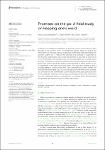Promises on the go: A field study on keeping one's word
| dc.contributor.author | Kanngiesser, P | |
| dc.contributor.author | Serko, D | |
| dc.contributor.author | Woike, JK | |
| dc.date.accessioned | 2023-04-28T13:58:44Z | |
| dc.date.available | 2023-04-28T13:58:44Z | |
| dc.date.issued | 2023-03-06 | |
| dc.identifier.issn | 1664-1078 | |
| dc.identifier.issn | 1664-1078 | |
| dc.identifier.other | ARTN 1097239 | |
| dc.identifier.uri | https://pearl.plymouth.ac.uk/handle/10026.1/20768 | |
| dc.description.abstract |
Promises are voluntary commitments to perform a future action and are often thought to be powerful levers for behavioral change. Here we studied the effectiveness of promises in two preregistered, incentivized field experiments with German students (N = 406) on the premises of a cafeteria. In Experiment 1, the majority of participants (63%) kept their promise to pay back at least half of a € 4-endowment, even though there was no foreseeable cost of breaking the promise, reputational or otherwise. Significantly fewer participants (22%) paid back money in a control group that faced a simple decision to return money or not. In Experiment 2, the majority of participants (54%) kept their promise to add a provided stamp to a postcard and mail it back (anonymously) within a week. We found similar return rates (52%) for a second group for which the word “promise” was omitted from the commitment. Our findings show that participants kept their word outside the laboratory while pursuing everyday activities even when there were no foreseeable negative consequences for breaking them, demonstrating that promises are effective levers for behavioral change. | |
| dc.format.extent | 1097239- | |
| dc.format.medium | Electronic-eCollection | |
| dc.language | eng | |
| dc.publisher | Frontiers Media | |
| dc.subject | promises | |
| dc.subject | commitments | |
| dc.subject | cheating | |
| dc.subject | honesty | |
| dc.subject | behavioral ethics | |
| dc.subject | behavioral change | |
| dc.subject | decision making | |
| dc.title | Promises on the go: A field study on keeping one's word | |
| dc.type | journal-article | |
| dc.type | Article | |
| plymouth.author-url | https://www.ncbi.nlm.nih.gov/pubmed/36949911 | |
| plymouth.volume | 14 | |
| plymouth.publication-status | Published online | |
| plymouth.journal | Frontiers in Psychology | |
| dc.identifier.doi | 10.3389/fpsyg.2023.1097239 | |
| plymouth.organisational-group | |Plymouth | |
| plymouth.organisational-group | |Plymouth|Faculty of Health | |
| plymouth.organisational-group | |Plymouth|Faculty of Health|School of Psychology | |
| plymouth.organisational-group | |Plymouth|REF 2021 Researchers by UoA | |
| plymouth.organisational-group | |Plymouth|Users by role | |
| plymouth.organisational-group | |Plymouth|Users by role|Academics | |
| plymouth.organisational-group | |Plymouth|REF 2021 Researchers by UoA|UoA04 Psychology, Psychiatry and Neuroscience | |
| plymouth.organisational-group | |Plymouth|REF 2021 Researchers by UoA|UoA04 Psychology, Psychiatry and Neuroscience|UoA04 REF peer reviewers | |
| plymouth.organisational-group | |Plymouth|REF 2021 Researchers by UoA|UoA04 Psychology, Psychiatry and Neuroscience|UoA04 Psychology, Psychiatry and Neuroscience MANUAL | |
| dc.publisher.place | Switzerland | |
| dcterms.dateAccepted | 2023-02-09 | |
| dc.date.updated | 2023-04-28T13:58:37Z | |
| dc.rights.embargodate | 2023-4-29 | |
| dc.identifier.eissn | 1664-1078 | |
| dc.rights.embargoperiod | forever | |
| rioxxterms.versionofrecord | 10.3389/fpsyg.2023.1097239 |


